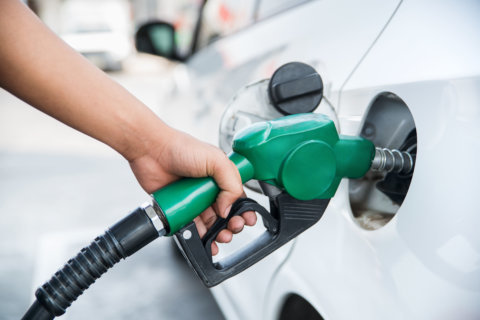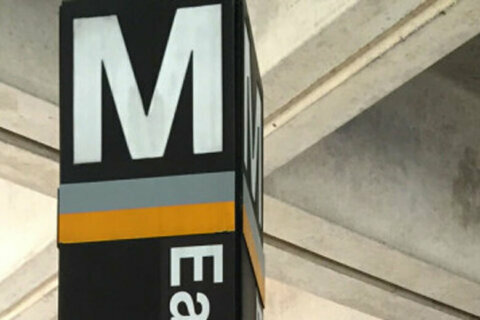More money for education and the environment, plus higher gas and cigarette taxes to help pay for transportation and health care needs are all part of Virginia Gov. Ralph Northam’s $135 billion two-year budget proposal unveiled Tuesday.
The proposal includes about $2.7 billion in net new spending over two years beginning July 1, 2020.
For the first time in years, a Virginia governor’s proposal is going to a friendly General Assembly, with Democrats set to take control of both chambers when the session starts Jan. 8.
Still, the budget plan is expected to be amended over the course of this winter’s session, including to account for other bills or proposals that are approved separately.
And Northam’s proposal leaves $100 million per year for the General Assembly to allocate to its own priorities.
Transportation
Under the proposal, Virginia drivers would no longer need to get their vehicles inspected, which currently cost them $20 a year. In the second year of the budget, vehicle registration fees would be cut in half.
However, the statewide gas tax would rise 4 cents per gallon per year for each of the next three years to a total of 34 cents per gallon. It would be tied to inflation.
Virginia’s gas tax revenue increases have slowed despite increases in the amount of driving, in part due to increasing fuel efficiency.
“This is not sustainable, and if we don’t address it now, it will be harder to fix in the future,” Northam said.
The change aims to have people who drive more in Virginia pay more, including drivers from out of state, Northam said.
Additional transportation fee changes are expected to be part of broader proposals in the General Assembly session, which could aim to ensure that drivers of alternative fuel cars also pay for road use, Transportation Secretary Shannon Valentine said.
The additional funding would pay for additional needs on roads, rails and other transportation modes.
That would include partially restoring $100 million in Northern Virginia Transportation Authority funding that was shifted last year to cover Metro costs. The authority would get an additional $45 million under the plan, on top of the $20 million provided last session as part of the Interstate 81 funding deal.
Transportation proposals also include testing grants for transit passes for some low-income families.
Valentine describes the transportation funding restructuring as a bridge to 10 to 15 years from now, when officials expect road taxes to be based on a fee-per-mile driven.
Health care
Doubling cigarette taxes to 60 cents per pack and doubling the tax on other similar products, such as vape cartridges, would raise millions to be used to keep down some health insurance costs.
Northam hopes to put the money toward lower premiums on a new Virginia health insurance exchange that would replace the state’s participation in the federal Affordable Care Act insurance marketplace.
“Smoking is the leading cause of preventable death in Virginia, and it directly causes more than $3 billion — $3 billion — in yearly health costs in our commonwealth,” Northam said.
The new marketplace would be funded through existing insurance fees currently paid to the federal government.
Under the higher cigarette taxes, Virginia’s per-pack tax would be above North Carolina’s rate, but well below the $1.20 per pack tax in West Virginia, $2 tax in Maryland and $4.50 tax in D.C.
The budget plan also includes more than 1,000 additional Medicaid waiver slots, and more money for community services boards and other mental health programs.
Education
The largest increase in proposed spending is for the state’s share of education costs.
Northam proposed nearly $550 million more for K-12 education above the $800 million increase required by state law.
The funding includes $99 million for more school counselors, and $145 million for the state’s share of a 3% raise for teachers and support staff effective July 1, 2021.
The budget assumes that slotlike “skill games” gambling that has popped up in Virginia is regulated and taxed to fill a hole from declining lottery revenues directed to K-12 schools.
Other proposals include additional prekindergarten spots and supports for at-risk kids, additional funding for schools with more lower-income students, and free community college for lower-income students getting degrees in certain fields.
To qualify, the degrees would need to be in technology, health care, public safety, early childhood education or a skilled trade; and the full-time students would need to perform community service or other training.
The budget also includes $22 million to help George Mason University keep up with enrollment increases, and significant additional funding for Norfolk State and Virginia State, the commonwealth’s two public historically black universities.
Environment
A large share of the $733 million for environmental improvements includes $400 million for water quality programs.
Alexandria would get an additional $65 million to help offset costs of the major sewage outfall system overhaul.
The budget would also remove language blocking Virginia from participating in the Regional Greenhouse Gas Initiative, a cap-and-trade program covering much of the northeastern U.S. that aims to limit pollution.
Northam also proposes $25 million for better environmental oversight by the Department of Environmental Quality.
Black Caucus supports
Less than a year after Northam was engulfed in a blackface scandal, his efforts to address inequities earned praise from the Virginia Legislative Black Caucus.
Specific items the group highlighted in a release include more money to address homelessness, affordable housing and eviction, efforts to reduce the racial disparity in maternal mortality rates, additional funding for HBCUs, additional funding for low-income or high-needs students, criminal justice reforms, and improvements to Virginia school curriculum to tell the full story of black history in the commonwealth.
Northam proposed $2.5 million to support school participation in programs from the Black History Museum and Cultural Center of Virginia, $2 million to increase school attendance at the American Civil War Museum, and a variety of funding for improvements to black history roadside markers and historical sites.
The budget would also shift $83,570 per year of state funding from the United Daughters of the Confederacy maintenance of Confederate cemeteries to a new African-American Cemeteries fund.
House Speaker-designee Eileen Filler-Corn called the budget proposal disciplined and fiscally prudent.
“I applaud the governor’s historic commitment to improve Virginia’s education system, protect our precious natural resources, address infant and maternal mortality, and make critical improvements to mental health care in the commonwealth, all while maintaining our AAA bond rating and adding $300 million to what would be a record-setting ‘rainy day’ cash reserve,” the Fairfax County Democrat said in a statement.
Republican leader Del. Todd Gilbert called plans to shift the additional tax revenue collected under federal GOP tax changes from potential additional taxpayer refunds to general funds “disappointing,” but he praised other parts of the proposals.
“The governor’s emphasis on K-12 education is laudable, and House Republicans look forward to working together with the incoming majority to craft a budget that invests in the core functions of government and protects our AAA bond rating,” Gilbert said in a statement.
Other changes
The budget would help start a public defender’s office in Prince William County for the first time, and fund other additional public defender positions. Today, people who need court-appointed lawyers in Prince William County are assigned lawyers who spend most of their time in private practice.
Additional money is also included to cover some costs of the Prince William County jail expansion.
The proposal would also fund some of the new clerks and salary adjustments requested in general district courts across Virginia.
Budget forecasts also assume improved tax collections through increased auditing, particularly in Northern Virginia, and more investigations of worker misclassification.
The budget would also make the thresholds clear for issuing an IRS Form 1099 to independent contractors, since some companies, such as Uber, use a $20,000 threshold for a 1099K, rather than the more common $600 threshold for a 1099M used by other companies, such as Lyft, Finance Secretary Aubrey Layne said.
State employees would not get a general pay raise under the budget plan, but there are targeted raises for positions, such as corrections officers and some social service workers.
The budget does include some funding increases for the state’s pension programs.
Local elections officials would also have salary requests fully funded.
Northam also proposed $5 million in matching funds for a Virginia Veterans Parade Field at the National Museum of the Army at Fort Belvoir, scheduled to open in June 2020.
Several public hearings around Virginia are scheduled before the General Assembly session, including one on Jan. 2, starting at 10 a.m., at the Hylton Performing Arts Center in Manassas.







